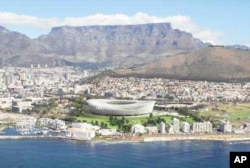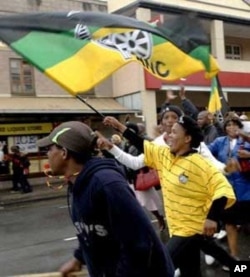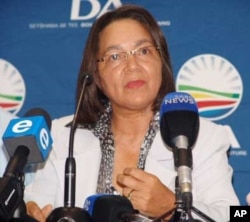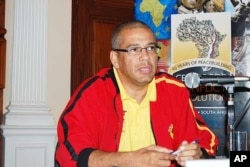This is Part 3 of a 5-part series: Municipal Elections in South Africa
Parts 1 / 2 / 3 / 4 / 5
Cape Town, on South Africa’s West Coast, is universally praised as one of the most beautiful cities in the world. The famous landmark of Table Mountain looms over the metropolis, an emerald green peninsula sliding into the Atlantic Ocean, the city divided into colorful old suburbs, ancient castles, public gardens, vineyards and pristine beaches.
But political analysts say there’ll be nothing pretty about the fight between the ruling African National Congress [ANC] and the main opposition party, the Democratic Alliance [DA], for control of Cape Town in local government elections on May 18.
In the previous municipal polls in 2006, the DA defeated the ANC in the “Mother City” – so called because in the 1600s it was the first town to be established in South Africa. The ANC dominates politics in the rest of the country, but ever since the nation’s first democratic elections in 1994 it has struggled for votes in the Western Cape.
ANC claims credit for advances in Cape Town
According to the DA, when it took over management of Cape Town five years ago, the city was “in decline” as a result of ANC “mismanagement.” The DA says the ANC council had spent only 60 percent of its budget, revenue collection had “collapsed” and essential services such as policing and health were “understaffed and inadequately equipped.”
The DA says its “progressive” policies corrected all of this, to the extent that Cape Town is today recognized by several independent local government monitors as the most efficient city in South Africa.
But ANC city councilor Xolani Sotashe insisted that the improvements are the result of ANC programs that the DA took over and implemented from 2006 until now. “The programs that they are actually boasting about today are the programs that are coming all the way from the ANC administration,” he said.
The DA said it’s delivered tens of thousands of houses in Cape Town townships over the past few years. Sotashe responded, “I can tell you right now the DA has not delivered a single house. All the housing deliveries they are talking about now were planned… by the ANC government.”
But Cherrel Africa, local government expert at the University of the Western Cape, said the DA has undoubtedly “made some advances and there are certain aspects where they’ve shown they are more efficient than the ANC.” She did, however, agree with Sotashe that often the DA is “picking up on preexisting programs [initiated by the ANC government].”
The ANC councilor said another reason for the DA’s good performance in Cape Town is support from the national ANC government. “The DA city council is using billions of rands of national government money for development. Then at the end of the day they go and lie to people and say that as the DA in the city of Cape Town, this is what they are doing for the people,” he said.
The DA insists that it has funded most improvements in Cape Town from its own funds, and that while it has used some national money for certain projects, it argues that these still require good management – something that it says was “missing” under the previous ANC municipality.
DA ‘doesn’t care about the poor’
The DA says it’s spent more than 450 million rands [US$ 67 million] on upgrading the impoverished black township of Khayelitsha, but Sotashe said the DA “represents the white minority’s views” in Cape Town and is “racist.”
Africa said the DA in the city has made two “glaring mistakes” that have opened it up to such accusations. First, it built unenclosed toilets for the black residents of Makhaza district; and second, it evicted scores of black squatters from an area near the affluent and mostly white suburb of Hout Bay. She said the DA managed these incidents “very badly,” although there’s still a “reservoir of positive sentiment” surrounding the DA in Cape Town.
The local government expert said the ANC’s labeling of the DA as racist and using that as part of its campaign strategy is “really problematic, because I think voting patterns in the Western Cape [are] not best explained by the racial motivations of voters.”
Africa is convinced the polls are about whether or not a particular party will be able to provide citizens with quality municipal services, such as good housing and clean water. “For the ordinary voter it’s about those issues, it’s about service delivery; it’s about the issues that affect people’s lives.”
But other observers insist that race will play a big part in the battle for Cape Town. The Western Cape province, where Cape Town is the largest city, is home to most of South Africa’s four and a half million colored or mixed race people. Certain analysts say whichever party gets the so-called “colored vote” will win the city.
But Cherrel Africa dismissed the “colored vote” as a “myth.”
She said previous elections in the Western Cape – the only province in South Africa where three different political parties, namely the now defunct and mostly white National Party, the ANC with its black majority support and the racially diverse DA have been in power at different times since 1994 – have shown that most coloreds don’t vote based purely on race.
“Certainly the Western Cape is very, very different. In this province, in elections generally, voters reward and punish parties based on political developments [not based on race],” said Africa.
Contest between colored mayoral candidates
Yet the ANC’s and the DA’s pursuit of colored support is clear in their choice of candidates for mayor. Both parties have selected high-profile colored political leaders – Tony Ehrenreich, the chief of the Congress of South African Trade Unions in the Western Cape in the case of the ANC, and veteran member of parliament Patricia de Lille in the case of the DA.
“They’re very, very strong candidates and they’re very good strategic choices from both political parties. So unfortunately it does become a contest between those two,” said Africa.
According to her, both Ehrenreich and de Lille have “mass appeal,” with the ANC candidate – who insists on living in a working class neighborhood and driving an old car – perhaps having a “populist edge.”
“He is a very credible and formidable opponent. The only problem [for the ANC] is that he’s one individual, and voters have observed a lot of division within the ANC provincially. So as an individual, I’m not sure that he’d be able to swing it for the ANC,” said Africa.
In the build-up to these elections, the ruling party in the Western Cape has been wracked by infighting, with a number of rival ANC groups arguing about leadership positions in the organization.
Africa said this has left “ANC voters in the Western Cape… quite disillusioned” and she suspects that many won’t vote on May 18. She told VOA, “They’re not necessarily switching to the DA, but because they’re opting out (of the polls), it has the effect of boosting the DA’s numbers.”










